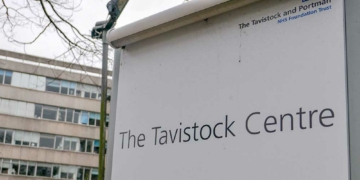The phrase ‘conversion therapy’ brings-up grotesque images of swivel-eyed god-fanciers and sinister clinics from an earlier era. Many were jubilant when a ban on the practice was announced in the Queen’s Speech in May. But the sly addition of ‘gender identity’ alongside sexual orientation sounded an alarm bell for some clinicians who feared that they could be criminalised for simply doing their job.
For years, those working in the field of gender dysphoria have been pushing the government to acknowledge that affirming a child’s cross-sex identity is not best practice. But with gender identity embedded into NHS services, breaking away from the ‘affirmation-only’ model will be messy.
Today, the government face a choice. On the one hand Stonewall, Mermaids and their attendant politicians are adamant that if children aren’t affirmed in their belief that they are in the ‘wrong body’ they will kill themselves in droves. On the other, there are clinicians and engaged citizens advocating an evidence-based approach.
This week the government sent the strongest signal yet that they are finally listening to the latter group, and that the right of professionals to offer therapeutic treatments to children with gender dysphoria will be protected in the forthcoming ban on conversion therapy.
“They have given clear assurances that they will protect free speech, safeguard children from irreversible treatment and uphold the independence of practitioners.”
In response to a petition drafted by the group Thoughtful Therapists the Government Equalities Office (GEO) committed to “safeguard young people from inappropriate interventions”. The statement continued:
“This ban must not impact on the independence and confidence of clinicians to support those who may be experiencing gender dysphoria.”
Welcoming the government response to their petition, a spokesperson from Thoughtful Therapists told Lesbian and Gay News:
“We are extremely happy with the government’s response to our petition. They have given clear assurances that they will protect free speech, safeguard children from irreversible treatment and uphold the independence of practitioners. We look forward to playing an active role in the upcoming consultation to ensure that these positive words translate into action.”
Whilst the GEO appear to have navigated a path through this ideological minefield, there is one line that warrants attention, the claim that the government will “ensure we do not inhibit people seeking support.”
The reasons underlying gender dysphoria are complex, often stemming from trauma, internalised homophobia or autistic spectrum disorders. A patient who is confident of their cross-sex identity might well consider that a therapist seeking to reconcile them with their body is inhibiting their ability to seek support. Such diametrically opposing views cannot be bridged with a placatory line.
Last year, following the departure of Stonewall ‘Senior Champion 2019’ Jonathon Slater from the post of Permanent Secretary, the Department for Education (DfE) released guidance advising schools to bar groups which promote the ’wrong body’ narrative. Coupled with this week’s response from the GEO it seems clear that some in government are alive to the pitfalls of a blanket ban on all forms of conversion therapy.
But whilst there’s been a shift in attitudes at the GEO (largely thanks the stewardship of Equalities Minister Liz Truss MP), politicians as a whole seem remarkably ill-informed. In a debate following a Stonewall-supported petition which gained 256,392 signatures, MPs fell over one another to denounce conversion therapy; the phrase ‘abhorrent practice’ was used by nine different MPs.
The drive to ban conversion therapy is a global one. Over the past few years, legislation has been passed in countries including Malta, Albania, Germany, Brazil and Ecuador. Last year the UN released a report calling for a global ban.
As with their counterparts GLAAD in the US and ILGA internationally, within the UK Stonewall are keen to include banning attempts to ‘convert’ those who identify as ‘ace’ (asexual and/or aromantic). Stonewall describes this as:
“An umbrella term used specifically to describe a lack of, varying, or occasional experiences of sexual attraction. This encompasses asexual people as well as those who identify as demisexual and grey-sexual.”
Putting aside the question of whether people with a low sex drive or no interest in relationships experience discrimination comparable to homophobia, this sets a concerning precedent. For example, it’s understood that trauma can lead to a loss of sexual attraction. But what therapist would want to help abuse survivors understand their feelings when doing so could lead to criminalisation on the basis of ‘asexual conversion therapy’? How can these safeguards can be worked into the bill without inciting the ire of Stonewall and their political minions?
It’s darkly comic that so many trans activists consider themselves left-wing – they are unwittingly serving the interests of multinational pharmaceutical companies.
The government’s newfound caution regarding conversion therapy is to be welcomed, but the lobby groups whose funding depends on seeing transphobia will not now slink away. Their campaigns should not be seen in isolation – the attempt to ban gender identity conversion therapy is part of an international push to medicalise gender non-conformity. The announcement of a further consultation will see Stonewall regrouping and briefing their supporters in parliament.
As with most ideological battles, it seems a strong bet that underscoring the attempt to ban conversion therapy is money. By embedding the lie that some people can be born in the wrong body, and that one’s ‘authentic self’ can be freed by medicine and surgery, a whole new market is created. It’s darkly comic that so many trans activists consider themselves left-wing – they are unwittingly serving the interests of multinational pharmaceutical companies.
The market in gender dysphoria is lucrative; it’s sobering to realise that the only thing standing between an increase in the profits of pharmaceutical companies are a handful of brave politicians and disparate groups of grassroots volunteers. Thoughtful Therapists have won this battle, but the war is far from over.
























Comments
No comments yet, be the first to leave a comment.